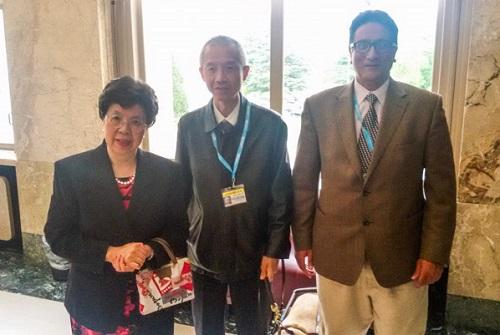Moving patients from the bottom to 'the heart and top' of health systems

IAPO was represented by new Chief Executive Officer Kawaldip Sehmi, Governing Board Chair K.P Tsang, and interim Chief Executive Officer Stephen McMahon.
Our main thoughts
After attending the Assembly for the first time, Kawaldip said:
Patients need to be at the heart and top of health systems, not at the bottom as they are now. This can happen through mobilizing local patient groups and coordinating and participating in the national research, advocacy, campaigning and engagement strategies aimed at the health system and the decision makers.
We need to leverage national and international partnerships to make the health systems deliver health services that are timely, accessible, affordable, acceptable and of an appropriate/accredited quality.
The UN's non-communicable diseases (NCDs) agenda was the 'belle of the ball' with over 200 NGO groups participating in the meetings and debates. This is a great opportunity for patient groups to: "intensify efforts towards a world free of the avoidable burden of non-communicable diseases, which claims the lives of 36 million people each year" *. This agenda needs to be balanced between the broad preventative programmes run within the general population and the curative and disease management programmes needed within the cancer, heart disease, diabetes, and chronic obstructive pulmonary disease (COPD) patient populations. The list of NCDs and their disease burden has to be expanded to cover other conditions too.
What did we say?
In addition to discussions with country representatives and the WHO secretariat, IAPO delivered three statements in response to agenda items at the meeting, including the ongoing discussions around the WHO relations with non-state actors, the post-2015 development goals, and on non-communicable diseases.
These statements highlight key policy positions on universal health coverage and patient-centred healthcare, the importance of health-systems strengthening and the involvement of patients at all levels of policy-making, implementation and service delivery. You can read the statements made by IAPO and other non-governmental organizations at WHA on the WHO website.
The overarching theme throughout the event was the post-2015 development goals, and how to turn high-level goals and targets into workable and measurable action.
Key emerging messages
Some of the key messages emerging from the meeting include:
- WHO and member states recognize the importance of and effort still needed to make sure health systems are working effectively toward universal health coverage
- The ongoing issue of inequity and gaps in access to essential medicines
- The impact of Ebola on populations and health systems; and how it highlighted the need for WHO and member states to strengthen the international emergency response systems.
Some of the ongoing issues include:
- The need to tackle the current and future risk of drug-resistant bacteria worldwide
- How to strengthen decision-making in health systems: including robust decision-making processes, ensuring decisions are based on evidence, and diversifying involvement in decision-making.
* Quoted from the UN General Assembly release, July 2014: http://www.un.org/press/en/2014/ga11530.doc.htm



